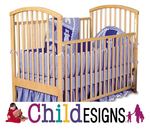You know what the US House Committee On Energy And Commerce Subcommittee on Oversight and Investigations needs? Publicists. The Committee held a hearing last Thursday titled, "Crib Safety: Assessing the Need for Better Oversight," and so far, I've only found one news report of the proceedings, and even that only covered the CPSC commissioner's proposal to require manufacturers to offer refunds, not just repair kits, when their cribs are recalled.
So thanks to the JPMA for the heads up on testimony from Executive Director Michael Dwyer and Nancy Cowles, the head of Kids In Danger, a safety and consumer advocacy group. Audio of the entire 2-hour hearing is now available on the House website, and on video is at C-SPAN. Meanwhile, here's a quick recap. The biggest revelation for me is probably the Dorel stuff at the bottom:
The hearing was intended to address the issue of federally mandated vs voluntary testing standards, and the JPMA's Dwyer repeatedly emphasized the consensus process by which ASTM standards [i.e. the voluntary layer of standards] are set, and the rigorous, ongoing testing and inspection process JPMA has in place to ensure products meet these standards.
In other words, if there's an issue with the standards as they exist right now, everyone is on the hook, not just manufacturers. Cowles pushed back and pointed to examples of durability and usage tests that consumer groups have been pushing for for 10 years, and which manufacturers have repeatedly voted down or tabled.
Last month, the ASTM changed the crib standards to eliminate most dropside cribs. Those changes only take effect, though, after a 180-day sell-through period, to allow manufacturers and retailers to clear out--i.e., sell, to you--all their soon-to-be-disapproved merchandise. [This sounds just like Jeremiah's astute-but-depressing analysis at Z Recs about the FDA's slowrolling BPA guidelines, which are entirely designed and timed to accommodate the business plans of, in this case, the canned food industry.]
In both his prepared statement [[pdf] and in questioning, Dwyer repeated the JPMA's constant attribution of product-related accidents and deaths to improper use or assembly, not faulty product design or manufacture.
Cowles asserted that products and parts that wear out or break under normal usage conditions, or that can readily be assembled in a way that causes death are manufacturing problems. She also attributed the recent tsunami of crib recalls to offshore and outsourced manufacturing.
Dwyer's most agitated comments came after mentions of post-recall statements by Stork-Craft's CEO about faulty crib assembly and parental errors, and a committee member bringing up the most recent recall of Dorel Asia cribs. Dwyer was all, Those cribs were not JPMA certified, and I saw photos of the crib where that baby died, and the parents had tried to fix it with duct tape, and they were charged with child endangerment, there was drug use involved, &c. &c. Which prompted Rep. Stupak to interrupt and clarify that the charges had all been dropped when the investigation concluded the problem was the crib.
But what caught me off guard was hearing that Dorel, one of the largest baby gear manufacturers in the world, and probably the single largest member of the JPMA, sells millions of non-JPMA certified products. Non-certified cribs, in fact. Under their own brand name. Is this why Dorel Asia is set up in Barbados, or why it operates under the conglomerate's furniture division, not its Juvenile Products division? Because the JPMA's executive director sure got his righteous indignation up when he called out that non-certified, rogue manufacturer.
Crib Safety: Assessing the Need for Better Oversight, January 21, 2010 [energycommerce.house.gov]
House Energy Subcmte. Hearing on Crib Safety [c-span.org]




Granted I am severely undercaffeinated today, but I am having a difficult time understanding why "JPMA certified" actually *means* anything, let alone anything useful. Is this certification overseen by a regulatory safety agency that does NOT have a manufacturer's stake in outcomes?